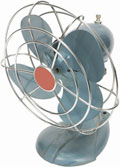Dear Umbra,
Please advise me on the best way to beat the summer heat! I live in a rather steamy studio apartment and thus far have been languishing under fans in front of the open window, lapping up ice cream, and taking many cold showers. I feel a tad guilty about the excess use of water in the pursuit of keeping cool. What’s worse — to sell out and buy an electricity-sucking air conditioner or send lots of cold water down the drain? Do you have any other chilling suggestions?
Stickily, with much thanks,
Joyce
New York, N.Y.
Dearest Joyce,

Fan-tastic.
I have no idea if it will be possible to beat the heat in your particular apartment without using an air conditioner or eating yourself silly on ice cream, but I’ll go over the various tactics that may save you from heat exhaustion.
The first precept of home cooling is to avoid home heating. Hot air wants to move into cool places. In climates with hot days and cooler nights, the simple “passive” cooling response is to block air from the home during the day and welcome it at night. Heat enters your apartment through your windows, walls, ceiling, and floors. Being as you have no control over the apartments above or below, and presumably no control over the walls, your range of actions is limited.
However, quite a bit of the heat in your home — in some cases up to 40 percent — comes through your windows. Your situation may improve if you block light and air from entering your apartment during the hot parts of the day. If you don’t have window shades, off to Windows R Us with you. Shutters or window awnings are the best because they stop sun before it hits window glass, but even thick reflective interior shades will help. If mornings are cool and afternoons are hot, open the windows and shades in the morning and shut them before the unbearable afternoon sun. If the entire day is hot, humid, and miserable, keep everything shut until evening comes. You get the point.
You may further leverage nature if you have a layout (and weather) that permits a cross breeze. Open the incoming breeze window a little, and the outgoing window a lot. On the out window place an out-facing window fan, which will pull the air through the house. Even if you have only two windows, facing the same direction, you may get relief by opening both, placing an inward fan on one and an outward on the other. The feeling of air across your skin can make you feel comfortable even if the air itself is hot. Our standard summer comfort range is 72 to 78 degrees Fahrenheit, but we’ll be comfy at 82 degrees with the help of a light breeze. Don’t say I didn’t give you hard numbers.
You reside in New York, where humidity comes with the summer package. Those readers in drier climates, however, can cool down on the cheap by wetting sheets and hanging them in front of open windows. The dry hot air will cool down as it crosses the moisture barrier. Sleeping under damp sheets is also effective. And speaking of damp: You’ll keep cooler and get more bang for your water-use buck if you wear a shirt during and after your shower. I beat quite a bit of heat last summer in Nueva York by donning shirts straight out of the washing machine. Yes, I just put them on and walked right out to the subway. They were dry in two stops and I was cool. It works especially well with those loose old man shirts.
As for other cheap ways to keep cool: Switch to fluorescent bulbs, which give off much less heat than incandescents. Don’t use any appliances in the house when it’s hot. If you must run the dishwasher, do so at night. Wait, who are we kidding? You don’t have a dishwasher in your studio apartment.
Sweatily,
Umbra

